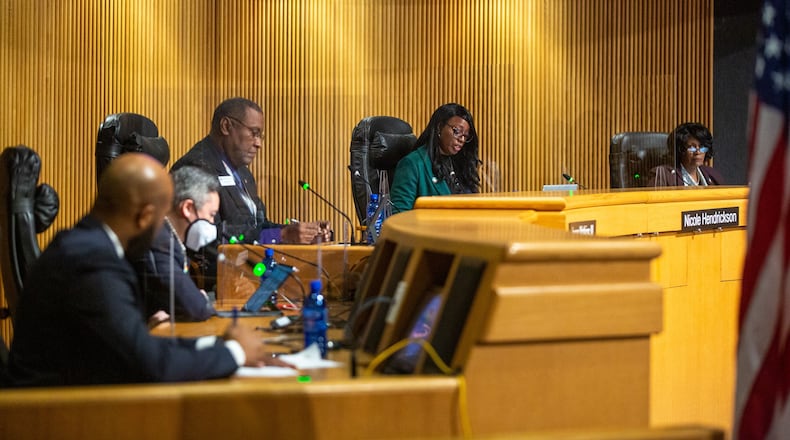After months of delays, a measure to formally decriminalize small amounts of marijuana in Gwinnett County is still in limbo, prompting residents to reprimand elected officials for their inaction.
Gwinnett’s Board of Commissioners was expected Tuesday to cast a vote on updating a county ordinance, which would allow anyone found with an ounce or less of marijuana to face lower penalties and no jail time.
But all except one member of the board voted to take the item off the meeting agenda. It had already been tabled twice in recent months, and it’s unclear when or if it will reappear for another vote.
“It’s irresponsible to not meet us in this moment with what’s needed to end this problem in what is being touted as the most diverse county in the Southeast,” said resident Simeon Harris during a public comment session.
Marijuana laws disproportionally affect minorities. Stricter punishments not only put more people in jail, but can hurt their employment and housing options down the road.
State law dictates that anyone found in possession of an ounce or less of marijuana can face up to one year in jail, a $1,000 fine or a year’s worth of community service. The ordinance rewrite would cap fines at $150 and community service at 20 hours for anyone found guilty.
No one in the county has faced fines or incarceration since 2018 solely for being caught with an ounce or less of marijuana, County Attorney Mike Ludwiczak previously told commissioners.
Gwinnett County Solicitor-General Brian Whiteside announced a few years ago that he would not prosecute individuals for an ounce or less of marijuana. Gwinnett County Police Department shortly followed suit and no longer writes tickets or arrests anyone caught with a small amount of the drug.
Nicole Love Hendrickson, chairwoman of the county commission, said the board needs more time to discuss the proposal with members of the community. She told the AJC in November that she’s not convinced that a systemic issue exists within the county.
“I don’t want to see anyone go to jail if there is a better alternative,” Hendrickson told the AJC. “I don’t want to see anyone have a rap sheet because of a minor possession. But after studying the data and research, I’ve concluded that in Gwinnett County, this is a solution in search of a problem.”
Commissioner Kirkland Carden, who has spearheaded the effort on the board and voted against taking it off Tuesday’s agenda, said commissioners should have voted with their conscience after examining the issue for months.
The change would bring the written law in line with the practice already carried out by Whiteside’s office, Carden said. The commissioner added that the update would prevent a future solicitor from prosecuting individuals for having small amounts of the drug.
Other cities and counties in Georgia have partially decriminalized small amounts of marijuana by setting their own penalties for the offense, though it still remains a misdemeanor crime in the state.
“Do the right thing, Nicole, for me and for the people in Gwinnett County,” said Dre Propst, who works for Alliance for Black Lives, during the public comment session. “That’s why we elected you.”
The ordinance update would let judges require violators to attend an educational class on drugs or enter a treatment program. But police officers could still charge individuals under the state’s more stringent law at their discretion.
Samia Abdulle, a local activist on behalf of immigrant and minority communities, urged county officials to explain their hesitancy to embrace decriminalization. She asked them to consider how harm could be reduced by putting the law on the books.
“This is not the time to back away,” Harris said. “This is the time to lean into justice.”
About the Author
Keep Reading
The Latest
Featured




